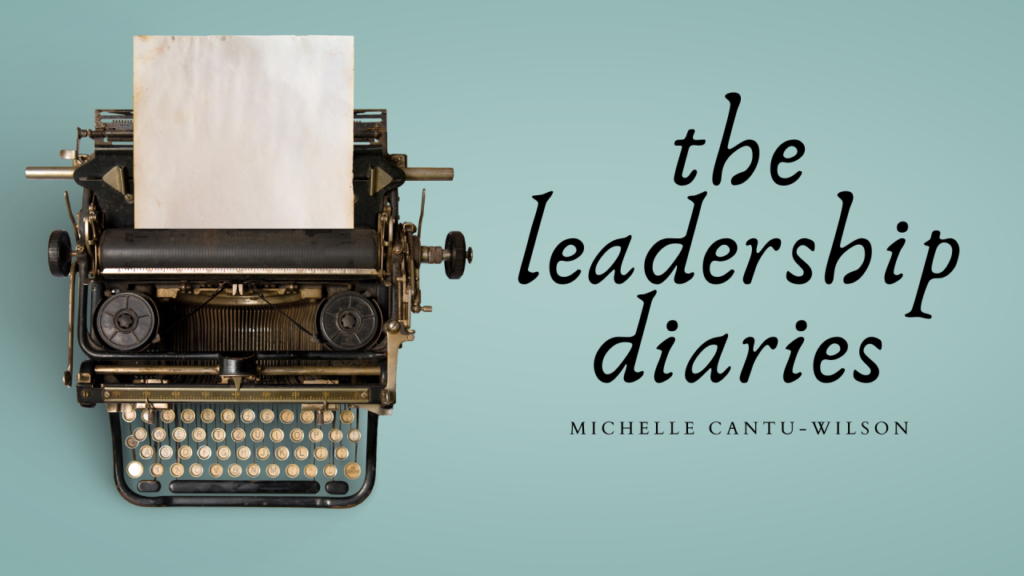
I’ve been journaling for as long as I can remember.
For me, it’s very much a part of who I am, but my journaling practice has evolved over the years and become much more purposeful. As a director in the field of teaching and learning, I find myself writing to capture anything and everything that could be helpful to faculty. As a mentor, I write to express what I know for my mentees. As an educator, I write to inspire other educators, and as a woman and Latina, I write to represent those who are like me.
Is writing for everyone? Perhaps not. But I feel very strongly that it can be a useful self-reflection tool for leaders. The thoughts of today can become the articles of tomorrow, the keynote speeches of tomorrow, the books of tomorrow. Or they can simply be the grounding thoughts that steady our tomorrows.

Why Do I Write? How Do I Write? When Do I Write?
I write to clear my head. As Flannery O’Conner said, “I write because I don’t know what I think until I read what I say.” Most days, I am so busy doing all the things that I don’t have time to organize my responses and reactions to people, places, or situations. When I sit down to write in the quiet of the morning, I am able to respond to and reframe earlier experiences – to consider them and turn them over in my mind and, ultimately, to learn from them.
I write to plan my day, my week, my month, my life. Sometimes, my morning pages are just a rambling list of “I need to . . . ” “I can’t forget . . . ” “I must . . . ” When things are particularly chaotic in my life, writing out my plans in longhand helps me feel more in control. To-do lists can be so perfunctory. Bullets by nature don’t allow for expounding on how I’m going to do something or why I’m going to take a particular approach.
I write to temper my reactions, and I write to vent. As leaders, it’s really important that we stay level. I take seriously the idea that leaders need to be emotionally intelligent, balanced, and prepared to handle any situation. This doesn’t mean we are not having some of the same reactions as others. We just save those reactions for later because the responsibility of leadership means we are capable of being in charge. We can unpack our feelings after, when we write. And because we sometimes have to deal with difficult people, a journal can be a safe place to write out the things we cannot always say. I’m not talking about rage-journaling; I just mean using pen and paper to develop helpful, guiding thoughts. Curse words are optional.

I write to formally capture presentations and speeches. I write most presentations in my head and memorize them. But there are times when it’s necessary to share the text, so I set aside some time to capture it – usually via typing. Sometimes I write on potential topics for presentations or articles. An idea will strike – like the one for this article – and I will draft it out so I don’t forget it. It is also very helpful to have a collection of potential topics at your fingertips.
Most days, I write in the mornings because I’m a morning person. It’s quiet, the coffee is hot, and and there is something supremely hopeful and poetic about the promise of a new day. I can also write in the middle of the day if I’m inspired, but that’s hardly ever the case. Sometimes, I can write from the couch while Disney+ plays an animal doctor show in the background and my kids doing homework at the kitchen table argue about whose laptop charger is whose. (Happening now.)
I mostly write in bound journals. I have a journal for healthy living – workout tips – recipes. I have a journal for my devotional time. I have a journal for work. I have a journal for life. I have way too many journals. I like good, old-fashioned legal pads, too, and I also write on my computer – like now. If I have nowhere to write – like when I’m out for long walk, I write in my head, and I record my thoughts on the voice memo app on my phone. The point is, I’m not married to my method. If I need to write, I will find a way to write.
I write because I need a private place that belongs only to me. I think the problem with leadership is that it can be such an outward-facing experience. We are always talking, planning, collaborating, interacting, engaging – with others. There is hardly ever time for us to engage with ourselves and our own thoughts. We need time to review, make sense of, to capture – to consider. We need time and space to draft out programs and projects and initiatives. We need a drawing board, in essence. Writing – whether it’s in OneNote or in a Word doc in Office 365 or in a journal – is a self-instituted and purposely self-serving pit stop where we can pause, take a breath, refuel, and return to the track with more clarity.

So, now let’s talk about you. Do you write? Are you interested in trying to write? Did you used to write once upon a time? Does writing help you? Do you see the value of leaders capturing their thoughts and experiences?
I’ve attached this link to a great article on some guiding questions for a leadership journal. And you can find additional prompts with a quick Google search. If writing is something you’d like to try, the key is to make it work for you. There is no correct approach, and if something you try doesn’t work, don’t be discouraged; pivot and try something else.
https://www.forbes.com/sites/hennainam/2017/04/02/to-be-an-effective-leader-keep-a-leadership-journal/?sh=2f5d429d3b4d
We never imagined we would be where we are today, did we? As we navigate through a global pandemic, we find that some days are harder than others as we try to keep our families and colleagues safe and as we deal with isolation, uncertainty, stress, and a jarring departure from the routines we have always known and upon which we have always relied. For some of us, writing can be a way to cope, to escape, to imagine or re-imagine, to connect or disconnect. It’s a flexible self-reflection tool that can be personalized to match our wants and needs. If you do give it a try, I hope it serves you well.
Best of luck and happy writing.